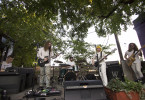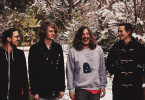OK: What are some of the benefits that you believe fans that attend this kind of show in an intimate setting will experience?
JM: I hate to use a word like magic, but there’s this magical intimacy between fans and artists. You’re up close and personal even if you’re not familiar with them, so it kind of drops any of the barriers, like if you’re at a bar and it’s really noisy and you can’t hear or focus on what’s being performed. It really brings fans and artist closer in an intimate setting. There’s a greater appreciation. I know the artists appreciate a listening room full of people who want to hear what they have to say and what they’re performing, and I think the fans appreciate that they’re being brought into that experience.
OK: I feel like it would appeal to people who do want to go see live music but may not be into being around huge crowds.
JM: I agree. I know for me, having a family, it’s harder to get to the later shows. I think we have a great young vibe in OKC right now that want to propel the scene and have fun, but might not be able to start their night at 11, so I hope it will appeal to that crowd too. People can have dinner at like 6:30 then come catch the show, so I’m crossing my fingers that will resonate and catch on with people.
OK: How important, in your mind, is it for artists to utilize resources like Fanswell and other innovative tools to help build and cater to their fan base?
JM: I think it’s really valuable to utilize these tools. I have been finding that some artists forget to promote their own shows and I think the more the merrier on these kind of resources, especially when they’re really artist friendly. I think there are a lot of people on the scene that want to support these artists.
OK: The current climate kind of forces you to be your own manager, booking agent, publicist, merch rep, and everything in between, when not a lot of these people who set out to make music had any intentions of messing with any of that.
JM: (Laughs) Yeah, they just found out they’re really good but there’s this whole art to the business side of it as well, and it is hard. But I think these resources provide a platform to execute that. For example, I feed everyone involved content so all they have to do is post it and it’s ready to go. I think the more artist-friendly the better. These resources are exceptional for those artists not super geared to the self-promotion or self-managing.
Whenever Graham and I met, I kind of had this vision of launching out of Oklahoma. These are our people and this is it, the place to launch it. I lived in Nashville for a while and it’s just huge — it’s almost overwhelming with artists and the business end of it. You kind of get lost going out there and don’t know where to fit in. But when you’re in a smaller music environment, it’s easier to get hands on and create your own resources.
OK: How can artists who want to be a part of this in the future reach out and connect with you all to make that happen?
JM: Get on Fanswell and sign up for the site first of all and get a profile. I tell all artists that that’s sort of the baseline for getting started because that’s how we do all of our correspondence with the offers and how they’d get paid. I’m always happy to visit with any artist that reaches out to me directly, either via email or our website.
—
Tickets to Saturday’s show are $15 and include beer and wine. Purchase tickets over at Fanswell, and follow Cellar Door Music Group on Twitter.




